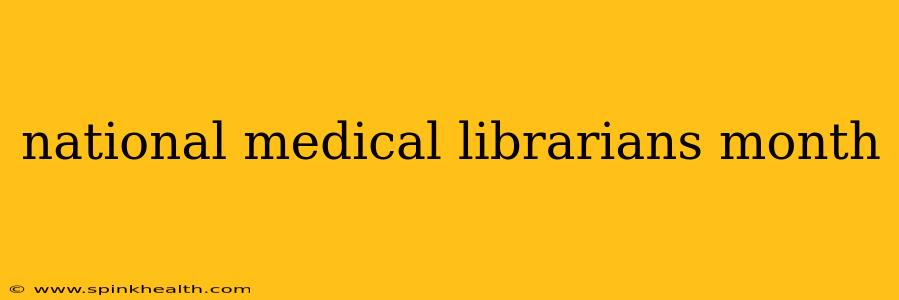October is National Medical Librarians Month, a time to celebrate the invaluable contributions of medical librarians to the healthcare field. These aren't just people who shelve books; they're information specialists, research partners, and critical thinkers who play a vital, often unseen, role in improving patient care and advancing medical knowledge. Their work, far from being dusty and outdated, is dynamic and crucial in today's rapidly evolving healthcare landscape. Let's delve into the world of medical librarianship and explore why this month of recognition is so deserved.
What do Medical Librarians Actually Do?
This is a question many people ask. The image of a quiet library with rows of books might spring to mind, but the reality is far more dynamic. Medical librarians are information detectives, adept at navigating the complex world of medical literature, research databases, and clinical guidelines. Their skills encompass far more than just finding books. They:
- Conduct comprehensive literature searches: Imagine a doctor researching a rare disease. A medical librarian can sift through millions of articles, identifying the most relevant and up-to-date studies, saving the doctor countless hours of research.
- Develop and maintain databases: They curate and organize vast amounts of information, making it accessible and easily searchable for healthcare professionals.
- Provide evidence-based information to clinicians: They translate complex research findings into practical, usable information for doctors, nurses, and other healthcare providers, directly impacting patient care.
- Educate healthcare professionals: They offer workshops and training sessions on research methodologies, information literacy, and effective use of medical databases.
- Support medical research: Medical librarians are crucial partners in research projects, assisting with literature reviews, data management, and disseminating research findings.
- Manage digital resources: In the digital age, they manage subscriptions to online databases, electronic journals, and other digital resources, ensuring healthcare professionals have access to the latest information.
How Do Medical Librarians Impact Patient Care?
The impact of medical librarians on patient care is indirect but profoundly significant. By providing healthcare professionals with timely and accurate information, they contribute to:
- Improved diagnosis and treatment: Access to the latest research ensures clinicians are using the most effective and up-to-date treatment protocols.
- Reduced medical errors: Accurate information reduces the risk of errors stemming from outdated or incomplete knowledge.
- Enhanced patient safety: Evidence-based practices, facilitated by medical librarians, contribute to safer and more effective healthcare.
- Better patient outcomes: Ultimately, the tireless work of medical librarians helps improve the overall quality of patient care.
What are Some Common Challenges Faced by Medical Librarians?
While their role is undeniably crucial, medical librarians also face several challenges:
- Keeping up with the ever-expanding volume of medical information: The amount of medical research published each year is staggering, making information management a constant challenge.
- Managing diverse information formats: Medical information comes in various forms – journal articles, clinical guidelines, patient education materials, and more – requiring librarians to be adept at navigating a variety of formats.
- Ensuring equitable access to information: Not all healthcare institutions have equal access to resources. Medical librarians work to overcome these disparities and ensure everyone has access to the information they need.
- Maintaining funding and staffing levels: Despite their vital role, medical librarianship often faces funding constraints and staffing shortages.
What is the Future of Medical Librarianship?
The future of medical librarianship is bright, driven by technological advancements and the increasing demand for evidence-based healthcare. We can expect to see:
- Greater emphasis on data analysis and visualization: Librarians will be increasingly involved in analyzing large datasets to identify trends and insights relevant to patient care and research.
- Expanded roles in telehealth and remote patient monitoring: As telehealth expands, medical librarians will play a vital role in ensuring healthcare professionals have access to the information they need to provide effective remote care.
- Increased collaboration with other healthcare professionals: The collaborative nature of healthcare will see medical librarians working more closely with physicians, nurses, and researchers.
National Medical Librarians Month is more than just a date on the calendar; it's a recognition of a profession that quietly yet powerfully impacts the lives of countless individuals. So, let us take this opportunity to express our gratitude to the dedicated medical librarians who work tirelessly to improve healthcare for all. Their contributions deserve not only our appreciation but also our continued support and investment in this crucial field.

